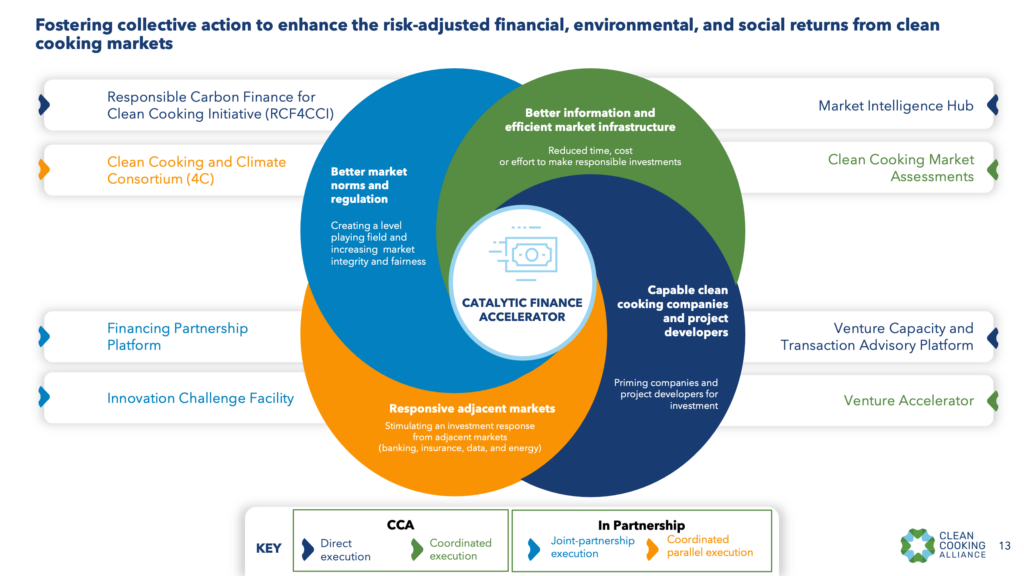Catalytic Finance Accelerator
A coalition of investors and other actors representing the clean cooking, carbon, and financial markets
A coalition of investors and other actors representing the clean cooking, carbon, and financial markets
Navigate this page
Achieving universal access to clean cooking requires unlocking funding and investment from current and new pools of capital. The Catalytic Finance Accelerator aims to mobilize at least $100 million in new commitments by 2026 and $500 million by 2030.
CCA’s Clean Cooking Systems Strategy highlighted that investments of at least $10 billion per year are needed to achieve universal access to clean cooking by 2030. Yet, year after year, the clean cooking ecosystem receives about $130 million—a significant funding shortfall. As a result, clean cooking remains one of the most underfunded development challenges. Sources of innovative finance, especially through the carbon and domestic financial markets, have the potential to narrow this funding gap.
CCA’s Catalytic Finance Accelerator is a coalition of representatives from the clean cooking, carbon, and financial markets, who share a common vision: clean cooking markets that attract growing numbers of investors, outcome-buyers, and funders offering a range of financing instruments to clean cooking companies and projects across their maturity cycle, in diverse country contexts—and transitioning billions of customers to higher-tier cooking solutions.
The Catalytic Finance Accelerator aims to secure at least $100 million in new commitments by 2026 and $500 million by 2030. Together, its targeted programs aim to increase the willingness and ability of funders to invest in clean cooking companies and projects.
The core strategy is to leverage carbon finance as a high-volume driver of clean cooking market growth, to catalyze large pools of traditional capital (e.g., guarantees, debt, equity, and other forms of blended capital); make traditional forms of non-returnable capital more effective and sustainable (e.g., grants and technical assistance); and lay the groundwork to unlock future pools of capital (e.g., revenue from monetizing contributions to the Sustainable Development Goals).
The Catalytic Finance Accelerator’s strategy is executed through four connected work-pillars but with mutually exclusive objectives to enable efficient implementation and drive accountability.

Leveling the playing field and increasing market integrity and fairness
This workstream includes the Responsible Carbon Finance project, the forthcoming Banking on Carbon project, and coordination with other regulatory and standards alliances – such as the CCA-led Clean Cooking and Climate Consortium and the Integrity Council for Voluntary Carbon Markets – to strengthen carbon frameworks and methodologies.
Reducing the time, cost, and effort in making investment decisions
This workstream includes the forthcoming Market Intelligence Hub project, which produces the Clean Cooking Industry Snapshot, Investor Resources, and the Clean Cooking Carbon Project Dashboard.
Stimulate an investment response from financial, capital, electricity, and other adjacent markets
This workstream includes the Financing Partnership Platform project founded by CCA in cooperation with the African Guarantee Fund, the UN Capital Development Fund, and the Innovation Challenges project jointly run by CCA and the UN Capital Development Fund, the first of which focused on digital innovations.
Priming clean cooking companies and project developers for investment
This workstream includes the Venture Catalyst, which builds the capacity of clean cooking companies and carbon project developers across their maturity cycles.